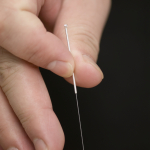02 Aug Demystifying Acupuncture
An Interview with an Acupuncturist
Acupuncture is one of the oldest, most commonly used medical procedures in the world. Originating in China more than 4,000 years ago, it is only in the last 40 years that interest has developed in the West. Debbie Goodwin at the Cary Acupuncture Clinic, is a licensed acupuncturist and herbalist who has been in private practice for four years.
Is there a difference between traditional Chinese medicine and acupuncture?
 Acupuncture is just one component under the umbrella of Traditional Chinese Medicine, which also includes herbal therapy, cupping, and nutritional and lifestyle recommendations. Acupuncture is the insertion of thin sterile needles into the body to illicit a response. For example, to experience relief from pain, improve digestion or reduce stress.
Acupuncture is just one component under the umbrella of Traditional Chinese Medicine, which also includes herbal therapy, cupping, and nutritional and lifestyle recommendations. Acupuncture is the insertion of thin sterile needles into the body to illicit a response. For example, to experience relief from pain, improve digestion or reduce stress.
What should I expect on my first visit?
You should expect to provide a complete health history on the first appointment. Pulse and tongue diagnosis are two main diagnostic tools in Chinese medicine so don’t be surprised if the acupuncturist asks to see your tongue!
An acupuncture treatment is usually part of the initial visit. New patient appointments could last up to an hour and a half while follow up visits average one hour.
Is there pain that people should be worried about?
Some patients will feel a small prick, a sense of warmth or heaviness at the site of needle insertion. Other patients don’t feel the needles at all. Actually, most of my patients fall asleep during their treatment.
How the needles work?
Let’s look at how acupuncture treats pain. Basically two things are happening. First, sticking a thin needle into the skin raises the neural threshold level and the brain immediately releases natural pain killers into the body. Secondly, where I insert the needle signals the brain to push blood flow to targeted areas on the body. Why is blood flow important? Because it carries nutrients and oxygen to the damaged area of the body to help the healing process.
How many needles are used?
It all depends on what I am treating and the overall health of the patient.
What are some common conditions that acupuncture can treat?
The World Health Organization (WHO) and the National Institute of Health (NIH) agree that acupuncture can effectively treat pain – including but not limited to neck, low back, shoulder, elbow and knee pain. Acupuncture can treat fibromyalgia, headaches, allergies, asthma & other respiratory problems, digestive issues and menopausal symptoms such as hot flashes. Acupuncture is also effective in treating mild depression, anxiety, stress and insomnia. For a comprehensive list of treatable conditions check out this website link: apps.who.int/medicinedocs.
Are there any side effects or complications?
There are positive side effects such as improved sleep, better digestion, an improved sense of well being and perhaps having more energy. A possible negative effect would be bruising or bleeding at the site of needle insertion or a patient may feel extremely tired after a treatment.
What is the one thing that you would say to someone who is reluctant that acupuncture can work for them?
If someone is coming in for pain relief, I ask that they commit to at least 3 treatments. The type of acupuncture I practice is called the balance method and I am looking for an immediate change. As the needles are inserted I want to see if the pain level decreases. Typically the patient will experience pain relief during their first treatment. If I can’t get the pain to shift by the 3rd treatment then acupuncture may not be for them. Have an open mind and try at least 3 treatments.
Why did you become an acupuncturist?
Years ago I suffered from chronic neck pain that led to migraines. After exhausting everything that western medicine had to offer I tried acupuncture. Symptom relief happened in the first treatment and I became intrigued with Chinese Medicine. Now I get to spend my days providing pain relief to patients!
Debbie Hoogenboom Goodwin, L.Ac. and Herbalist is the founder of The Cary Acupuncture Clinic in Cary, NC. She earned her BA from Purdue University and received a Master’s in Chinese Medicine from Daoist Traditions in Asheville, NC in 2009. In addition, Debbie is a recent graduate of the Inner Light Yoga Teacher Training program and incorporates relaxing yoga breathing techniques and stretching postures with many of her patients. In 2014 Chinese Face Reading and Nine Star Ki will also be available at the Cary Acupuncture Clinic.

Sorry, the comment form is closed at this time.